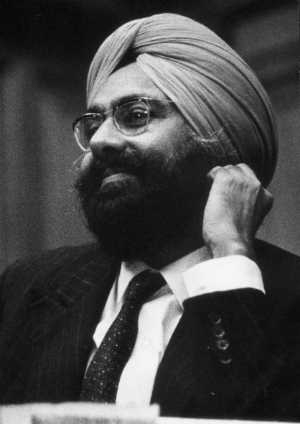Khushwant Singh, born February 2, 1915, lived life to his fullest before passing away in his hundredth year. Abhishek Mukherjee looks at the cricket ties of the celebrated author.
Khushwant Singh had us in splits with his impeccable sense of humour; he had won our hearts with Train to Pakistan; he had edited The Illustrated Weekly of India, among others; he received the Rockefeller Grant and was honoured with the Padma Vibhushan; and he won the prestigious Sahitya Academy Fellowship Award.
Khushwant Singh was also a keen follower of cricket.
Sample this: “I was one of the 600 million monkeys who watched all the matches (of the 1996 World Cup. And I have never played cricket nor know the difference between silly mid-on or a long slip, between yorkers, googlies or off and on spins. There is something about this game which is as addictive as cocaine or hashish.”
Eyes, Beena’s eyes
Remember Beena from Khushwant Singh’s Book of Unforgettable Woman? Remember that conversation between Beena and “Madan, the Madan”? Madan’s line will definitely make its way to one of the finest in Indian literature:
Beena: Oh Bhraji, I am no good. I couldn’t see the cricket ball coming towards me at that speed.
Madan: Yes, you could. With those eyes of yours you could hit anything for a six.
The quintessential classicist
Then, there was that chapter called Hai hai cricket! from Khushwant Singh’s Big Book of Malice where he lamented about the lost charm of the sport in his own inimitable style: “Cricket used to be a gentleman’s game played by gentlemen and watched by genteel ladies in their Sunday-best saris. It is no longer so. Today (in 1996), competitive cricket is played by professionals who sweat their guts out to make big money in the big years of their youth and they live on their earnings augmented by fees received as commentators on radio or TV, writing articles for sports columns of newspapers and magazines, or advertising fizzy drinks.”
He wasn’t very kind to the ones at the other end of the fence either: “Spectators have likewise ceased to be gentle folk (who watch the game comfortably seated on their sofas), but hoi polloi who troop in their thousands to sports stadia armed with whistles, bugles, firecrackers, soda water bottles and missiles to hurl at fielders to come within range. They have no sportsmanship. When one of their batsmen hits a six or their bowler gets a wicket, they explode with enthusiastic yells of triumph. When players of the opposing side do the same, they relapse into sullen silence as if naanee mar gayee (their mother’s mother has died).”
As Chinnaswamy had erupted with India’s victory over Pakistan and Eden Gardens went a notch ahead by showering bottles the next match against Sri Lanka, Singh did not really like it: “While we were gloating over the breastbeating in Pakistan following its defeat, we did worse when we were humiliated by Sri Lanka… We outdid the Pakistanis in poor sportsmanship and bad behaviour when the Sri Lankans pulverised our team.”
The historian was at work, too…
Trust Singh to come up with a compliment amidst a barrage of not-so-kind words. In his article Exhausted Highness on Outlook, Singh wrote of the Maharaja of Patiala: “He was a headstrong bully, a debauch, drunkard, womaniser and philanderer. Nevertheless he became chancellor of the Chamber of Princes, represented India at the Imperial War Council during World War I and the Sikhs at the First Round Table Conference. He also put Indian cricket on a firm wicket.”
… as was the humorist
No discussion on Singh can be complete without Khushwant Singh’s Joke Book, where he had recollected an (nobody has ever validated this) anecdote from RA Goswami of Warangal: “At a Miss India contest, a gentleman congratulated Sunil Gavaskar, saying, ‘Indian cricket really owes you a debt of gratitude to you for producing two such great cricketers — (Sachin) Tendulkar and (Vinod) Kambli.’ Hearing this, the Little Master shot back, ‘You must be mistaken; I never produced them. I have never been near either of their mothers.”
And they loved him back
This tale goes back to the days when Tiger Pataudi was a part of Sportsworld. Mudar Patherya, Tiger’s colleague, had recalled an incident from the compilation Pataudi — Nawab of Cricket:
“After he had encountered an Iqbal line that I had used in one of my copies on the 1984 Pakistan tour, sent me a handwritten two liner: ‘The next time you quote Iqbal, get Khushwant Singh to translate’.”

